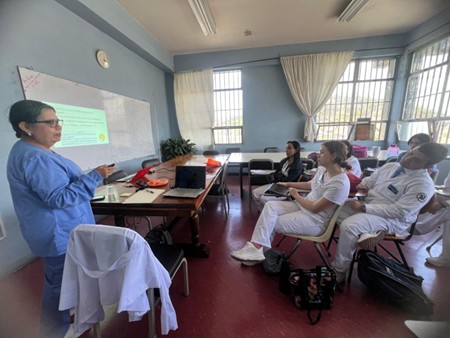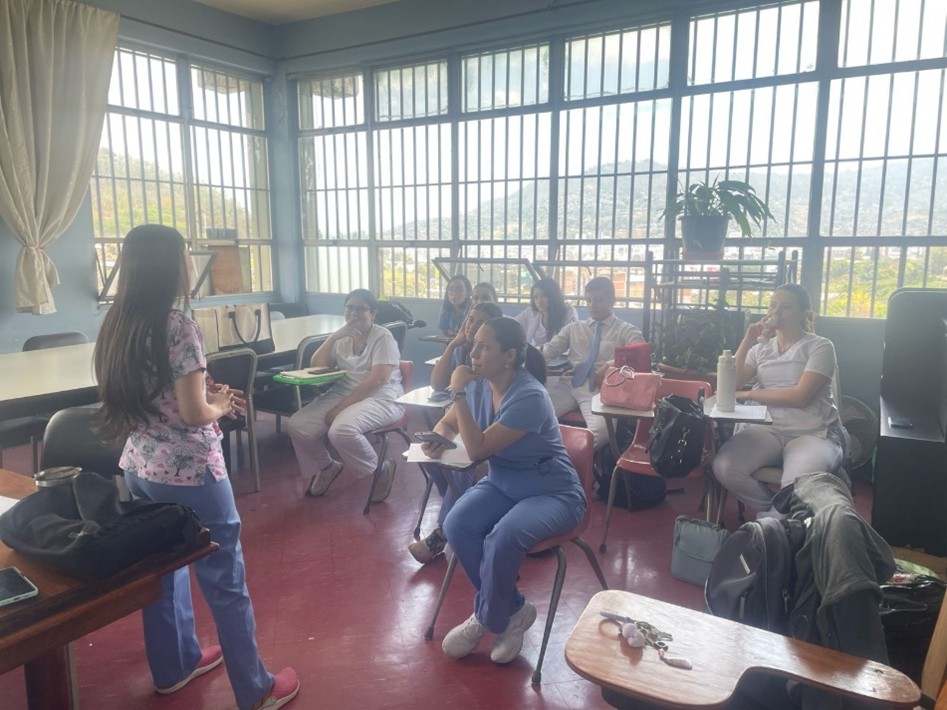Assisted Learning Sessions Program on Research Methodology at Hospital Escuela
The assisted learning sessions are part of a structured program aimed at strengthening research methodology training among healthcare professionals. This program is designed to be replicated with various groups within Hospital Escuela and other academic institutions and health facilities. Currently, it is being implemented with first-year residents and faculty of the Pediatrics Postgraduate Program at the National Autonomous University of Honduras (UNAH), and will later be extended to additional groups.
Coordination:
1. Department of Academic Affairs, Hospital Escuela
2. TGHN LAC Honduras Team
Target audience: Undergraduate and postgraduate health sciences students.
Duration: Each session lasts one hour and is conducted weekly. Multiple cycles will be held throughout the year for different groups.
Modality: In-person and online (TGHN LAC Platform: https://lac.tghn.org/)
Language: Spanish
Program structure: The assisted learning sessions are designed to provide comprehensive training in research methodology. Through theoretical and practical activities, participants will strengthen their skills in:
- Formulating research questions
- Developing study protocols
- Complying with international ethical standards in clinical research
- Critical analysis and application of concepts in clinical and academic settings
Topics:
| No. | Topic |
|---|---|
| 1 | The Research Question |
| 2 | Study Protocol: Part 1 |
| 3 | Study Protocol: Part 2 |
| 4 | Good Clinical Practice Guidelines |
| 5 | Introduction to Clinical Research |
Session Description:
These sessions will provide essential knowledge on health research methodology, focusing on formulating research questions, developing study protocols, and adhering to international ethical standards. Each session includes theoretical and practical activities that facilitate the application of concepts in clinical and academic contexts. Online resources from the TGHN LAC platform will be used to enhance learning and access to complementary materials.
Resources used:
The following resources from the TGHN LAC platform will be used to support the sessions:
- Introduction to Clinical Research
- The Research Question
- Study Protocol
- Good Clinical Practice ICH E6 (R2)
Expected Outcomes:
- Understanding of scientific methodology applied to clinical research
- Development of skills to formulate effective research questions
- Knowledge of ethical principles and good clinical practice standards
- Application of concepts in clinical study planning
MARCH–APRIL 2025
Assisted Learning Sessions in Research Methodology with the Pediatrics Postgraduate Program, UNAH – Hospital Escuela
As part of the Assisted Learning Sessions Program on Research Methodology, sessions were held between March and April 2025 with first-year residents of the Pediatrics Postgraduate Program at UNAH, hosted at Hospital Escuela. This initiative is part of a replicable training strategy for various groups of healthcare professionals and students across Hospital Escuela and other academic and health institutions.
The sessions were coordinated by the Department of Academic Affairs of Hospital Escuela and facilitated by its team in collaboration with TGHN LAC Honduras. Over five sessions, core topics in clinical research methodology were addressed through theoretical and practical activities, integrated with online courses from the TGHN LAC platform.
Training cycle outcomes:
Thanks to the commitment of the nine participants, the following progress was achieved in their research project planning:
- Research topic selection
- A well-formulated research question
- A preliminary study title
- Clearly defined general and specific objectives
The research topics selected by the residents included relevant pediatric research areas such as neurodevelopmental outcomes after perinatal asphyxia, screening for congenital heart defects, use of digital tools for febrile neutropenia management, congenital malformations, follow-up of patients with esophageal atresia, and quality of life in pediatric patients with epilepsy, uncontrolled bronchial asthma, and acute brain injury secondary to trauma.
This experience demonstrates how the assisted learning model supports a structured process for formulating research projects, promoting critical thinking, group discussion, the use of digital resources, and the strengthening of local research capacity.

Lic. Xiomara Medina facilitates an assisted learning session with Pediatric residents at Hospital Escuela, encouraging analysis and discussion on research methodology.

Dr. Clarisa Aguilar leads a session with Pediatric residents, fostering participation and skills development in research methodology.

Dr. Clarisa Aguilar with the residents during one of the assisted learning sessions.
Support the community
Thank you for visiting The Global Health Network, please take a moment to read this important message. As you know, our aim is to enable equity in access to research knowledge and this is successfully delivering support and training to 1000’s of research teams all over the world. But we need your support!. If you have benefited from this research skills and knowledge sharing facility, please help us sustain this remarkable and unique provision of information for those who could otherwise not access such support and training. We would be really grateful if you could make a donation or ask your employer or organisation to contribute to the costs of maintaining this platform and the generation of new contents for all users. Just a small contribution from everyone who can afford to pay would keep this available for those who cannot. Thank you, we really appreciate your part in this community effort to better equity in global health research.
